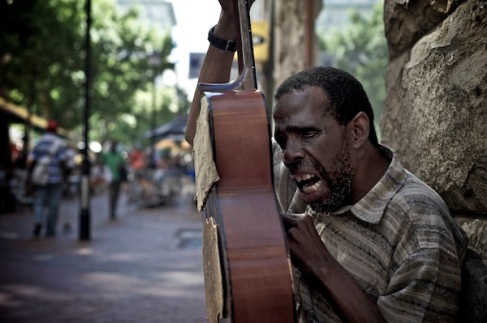This started out as an admonishment of Cape Town residents for our tardy outrage and showboat sense of civic responsibility. We turned up in huge numbers, I was going to say, when city law-enforcement officers publicly assaulted and arrested Lunga Goodman Nono, but where were we when the laws and regulations he supposedly fell foul of were made? Public participation in law-making, after all, forms one of the key pillars of our constitutional democracy. It’s on us if unjust laws make it into the statute books.
But after some sniffing around and hammering the doors of shirking City of Cape Town officials, I discovered that the widely reported by-laws that Nono supposedly contravened, the ones that, according to reports, limited the hours he could play his guitar to a 75-minute slot between 12.45pm and 2pm on weekdays and 10am to midnight on Saturdays, do not actually exist.
City of Cape Town officials instead conceded that those hours come from an apartheid-era policy document last updated in 1993. They do not come from the provisions of a by-law, despite deliberate attempts by mayor Patricia de Lille and JP Smith, mayoral committee member for safety and security, to create the impression that the actions of the law-enforcement officers had some basis in the rule of law.
Let me rewind quickly for those not familiar with the story.
Last week, Cape Town law enforcement accosted Nono, a blind 51-year-old guitarist who’s been performing for tips at St George’s Mall since 2008. During the altercation, partially captured on video, the law-enforcement officials broke Nono’s guitar, threw him to the ground and frogmarched him into the back of a waiting law-enforcement van. Nono and his wife were later fined and charged, according to officials.
City officials said, in the wake of the incident, that Nono had repeatedly ignored warnings that he was performing outside of his allotted time, in contravention of the city’s by-laws. This is what ostensibly earned him on that day the attention of the law-enforcement officers, who then crossed the line from law enforcement to assault and were suspended for three months pending a disciplinary hearing after the video of Nono’s assault hit social media.
“The city supports busking and creative forms of entrepreneurship. In this case, officers reported that they were merely trying to enforce that the busker stick to the regulated times, following a number of complaints from local businesses,” JP Smith, mayoral committee member for safety and security, said in a media statement that repeated the word “by-laws” at least six times. Smith promised an investigation of the actions of the officers.
Mayor Patricia de Lille issued a statement days after confirming that an investigation had been launched and suspension proceedings had begun against three law-enforcement officers involved in the incident with Nono. Like Smith, De Lille suggested that the incident, despite how it turned out, was based on balancing Nono’s right to freedom of expression and artistic creativity against the rule of law.
De Lille, however, failed to acknowledge that no applicable law existed in this instance.
According to Richard Bosman, City of Cape Town executive director of safety and security, the law-enforcement officers were enforcing a Cape Town council policy document from 1993. This policy document, a copy of which Bosman could not produce let alone name without reservations, despite repeated requests, is said to govern the time periods during which busking is allowed in the city centre.
It is this archaic policy document of dubious legal enforceability and questionable existence that set the suspended law-enforcement officers on a collision course with Nono. Bosman also said Nono was fined R500 and charged with “malicious injury to property” while his wife Abigail was fined R1 000 and charged with “disobeying an instruction from a peace officer”, supposedly under the prohibited behaviours section of the “streets, public places and the prevention of nuisances by-law”. This by-law, ironically, specifically recognises that street entertainers like Nono are not noise nuisances.
Responding to whether it was appropriate or justifiable to use an apartheid-era policy to limit the abilities of a poor, black, elderly, blind man to make a living in post-apartheid South Africa, Solly Malatsi, De Lille’s spokesperson, expressed regret that the policy had not been rescinded.
“This is exactly why the mayor has initiated a review of the laws and regulations governing busking following the unfortunate incident involving Mr Lunga Goodman Nono,” he said.
Malatsi also backed De Lille in saying this was an isolated incident.
However, in May this year, the city’s anti-land invasion unit, part of the same law-enforcement department that assaulted Nono, was caught using legal pretext to evict shack dwellers who’d occupied a vacant piece of city-owned land. In that instance, the city first claimed the unit was acting in terms of the Protection of the Possession of Property Act, but after it was exposed that no such act existed, the city invoked the Roman-era common law notion of “counter-spoliation”. Several legal experts said, however, that counter-spoilation did not apply in the case of the evicted shack dwellers.
These incidents, taken in combination with the street lights in Khayelitsha and bucket toilets within the city’s municipal bounds — both instances in recent history where the city was again accused of being liberal with the truth to the detriment of the poor — call into question whether the City of Cape Town is living up to its motto of “This City Works for You”. If these incidents are anything to go by, the city’s real motto is “This City Works for You, except if you are poor”. If you are poor, this city, as Nono said, has had enough of you.
Lunga and Abigail Nono, by the way, are still burdened with the fines and possibly the charges from their harrowing experience.
Photo credit: Lunga Goodman Nono, by Anton Crone




